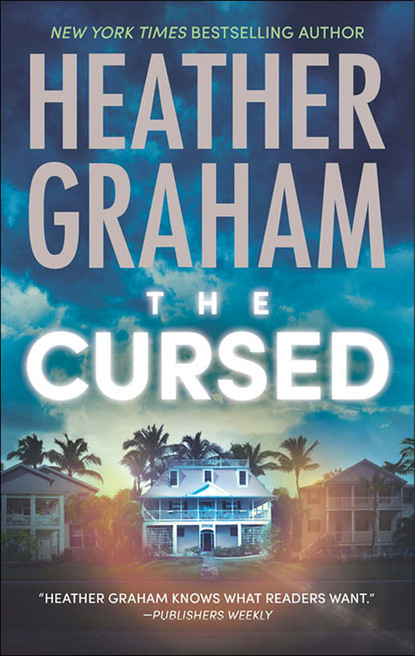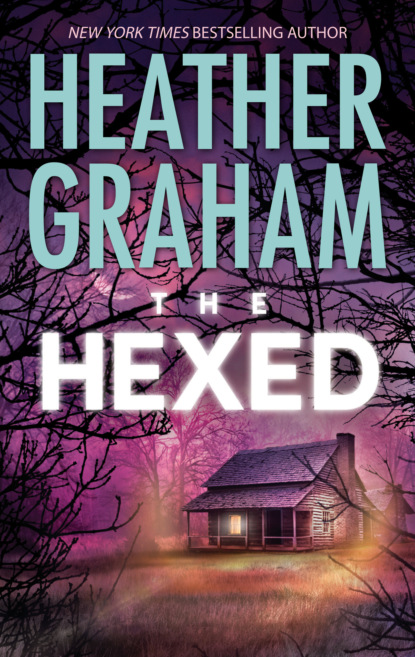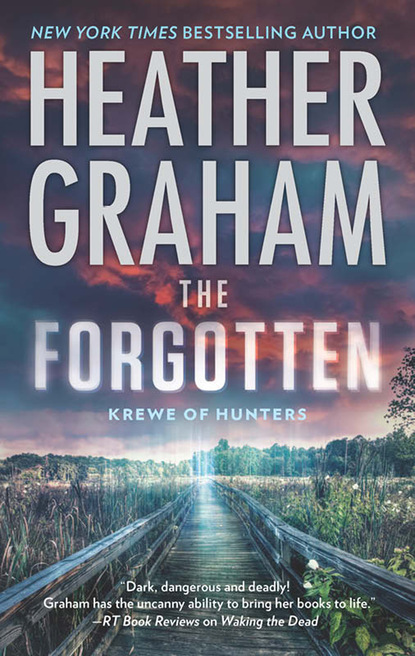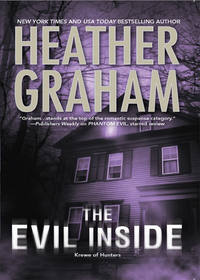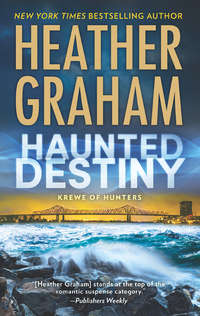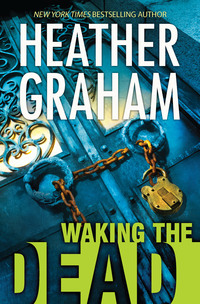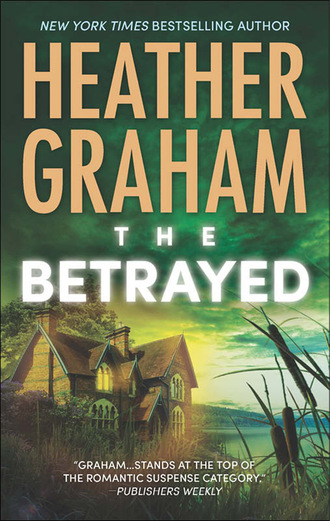
Полная версия
The Betrayed
She knew the good and the bad of history. As a child, she’d had a gentle master who’d been happy to spend time with his slaves, attend baptisms of their children and be as generous as a father. At his death she’d found herself the property of a new master; she said he was the cruelest man to ever walk the earth. The daughter of her first owner—who’d been forced to sell the slaves—had actually helped Candy escape, and in their friendship, they’d both realized how wrong it was for any man or woman to own any other.
They’d ended up living at the cottage down from Irving’s Sunnyside, and while Sarah Jane—Candy’s friend—had gone on after death, Candy had lingered. But that was because she’d fallen in love with one of the few Confederate soldiers who’d died here, brought north to be cared for by his brother, who had chosen to fight for the Union.
Colonel Daniel Parker remained in the house, as well. He and Candy were together in death as they’d never been in life.
Candy paused long enough to give Rollo a spectral pat. Rollo knew she was there. His tail thumped on the floor. Smiling, Candy perched on the desk and looked at Mo. “What happened? What did you and Rollo find?”
Mo sighed and gave up on work, leaning back in her chair. “A man’s head without a body, a woman’s body without a head, the man’s body—and the woman’s head.”
Candy stared at her in dismay. “How awful! Do they know, was it the politician from New York they were looking for?”
Mo nodded gravely. “And it’s not...it’s not just that he was dead. He was murdered. Horribly.” She went on to tell Candy about the morning—about everything they’d discovered.
Candy shuddered. “And with the village and all of Tarrytown bustling with our October visitors...that makes it even worse. I hope they find the murderer quickly.”
“Lieutenant Purbeck is running the investigation. At least, I think he is. An FBI man showed up, too,” Mo said.
“Federal Bureau of Investigation,” Candy said. She might be a ghost, but she loved watching as time went by, even though—as she’d often told Mo—time didn’t always go by so well. Wars went on; people just didn’t seem to learn. Candy and her beloved Daniel Parker liked walking the grounds along the river—and keeping up with history as it passed.
“Well, Mr. Highsmith was an important man,” Candy said knowingly.
“Yes, very,” Mo agreed.
“And this FBI man, he seems to be capable and good?” Candy asked.
Mo thought about her answer. Then she nodded. “He was serious and seemed to understand that...that Rollo knew what he was after when we found a body that wasn’t the right body,” she said. Actually, she’d liked the man immediately. She wondered if she’d been influenced by the fact he was very good-looking. Tall, dark, blue eyed, altogether striking. If he walked into a room, anyone—male or female—would notice, even if he was in a typical dark suit. He wore the suit damned well. She remembered feeling stunned when she’d fallen into his arms. Just for a split second, of course, but he had given her pause.
“He looks capable,” she said. He looks like he belongs on the cover of GQ, she thought.
Candy nodded. “So, the police are investigating and the federal government is involved. What happened is devastating—unimaginable!—but you have done what they asked you to do. Now let them handle it. I understand that you can’t forget it. To suggest such a thing would be ridiculous. But let them do their work, and you concentrate on yours. Maybe you should take a vacation, leave this place until they find the killer.”
“I don’t think I can.”
“And why not?”
“What if...?”
“What if what?” Candy asked.
“What if the killer isn’t finished?” Mo wondered aloud. The very possibility chilled her. “What if it wasn’t a political assassination? I—I can’t leave now. Rollo and I might be needed again and if we are, there’s always the hope that we’ll find the next victim still alive. Before he kills him—or her.”
* * *
“Here’s what I have to tell you,” Dr. Mortenson said, leaning against one of the gurneys at the morgue. “The two bodies, when put back together, are definitely two people. Not more, in other words. Thank God. We still haven’t ascertained the identity of the woman, but we’re running fingerprints and searching out dental records.”
“How did they die?” Aidan asked.
Mortenson frowned at him for a minute, as though to say, They were decapitated. Wasn’t that perfectly clear?
But he quickly understood. He sighed. “I wish I could tell you it was the clean sweep of a sword or one blow from a big ax. A quick death.”
Aidan’s heart sank. He suddenly knew exactly what that expression meant. “But it wasn’t that way?” he asked.
Behind him, Voorhaven sucked in his breath.
“A hatchet job?” Van Camp asked. His tone was rigid. Aidan liked Van Camp; he seemed to be a by-the-book detective, calm, collected, doing his job with dedication and competence. But he had retained empathy for victims.
He was probably better suited for this job than Aidan. Because, like it or not, Aidan knew he wasn’t really calm, collected and by the book. He wasn’t just empathetic—he was involved.
“Yes, but...thankfully, the victims were dead before their heads were removed.”
“How were they killed?” Aidan asked bluntly.
“Strangulation. Manual strangulation. That should help you. Of course, with the chop job—sorry about that—it’s difficult to get a complete picture. But I couldn’t find ligature marks and there was heavy bruising around the neck. Now, the trauma could’ve come from the, er, removal of the heads.”
He paused. “I worked in the city for years and saw just about every form of murder out there, although some sick bastard will always find a new twist. In my opinion, however, they were manually strangled, something that takes a significant amount of strength, especially considering the size of a man like Highsmith. The heads were removed afterward, probably for effect, for theatricality—but that kind of theorizing belongs to you investigators. I’m merely stating the obvious here.”
“Or what appears to be obvious,” Aidan murmured.
Mortenson hiked up two bushy white brows. “Yes, well, as I said, I leave theorizing to you gentlemen.” He walked to one of the gurneys in the room. Both bodies had, mercifully, been covered with sheets.
Now Mortenson rolled back the first.
Aidan winced inwardly. He didn’t want to see what was revealed. He had to.
Mortenson started with the female victim.
“Female, between the ages of twenty-eight and thirty-five. Approximately five foot seven in life, 135 pounds. In excellent shape and health, judging by the state of her heart and organs, muscles and bones. She was a blue-eyed blonde, no contacts, highlights in her hair. We’ve done a computer mock-up of what she looked like before the tissue and muscle damage to the face. We’re turning that over to the police now.”
Mortenson glanced at his clipboard and his notes, then pulled out several sheets, handing them to Aidan, Van Camp and Voorhaven.
Aidan studied the woman’s face. She had nice bone structure, large eyes, a small nose and a pert chin. But there was no life in the image; he wasn’t sure he would have recognized her even if he’d known her.
“What about her clothing?” Van Camp asked.
“Her personal effects are boxed and ready for you and the lab,” Mortenson said. “But due to the blood on the outfit and various fluids stiffening the fabric, I believe she was killed and then beheaded in the suit you saw on the body, under that big coat. I’ve rushed everything, and the lab has, too.”
“Thanks,” Aidan said.
“Now, as to Mr. Highsmith...” Mortenson began.
Aidan felt his muscles tighten. He steeled himself not to flinch, not to show emotion. He didn’t want to be hauled off the case.
Mortenson rolled the sheet back.
And there was Richard, the head placed where it should have been but showing not just the trauma of death, but of autopsy, too. He was almost unrecognizable.
Mortenson was all business, his gloved hands showing what his medical eye saw as he pointed out the bruising caused by the strangulation that had ended Highsmith’s life.
Aidan stared at the corpse on the gurney. Richard Highsmith looked like something created by a master of bizarre special effects.
Mortenson’s voice droned on and on, until finally the sheet was drawn back over Richard.
“I’ll keep you posted,” Dr. Mortenson said. “But I’m not sure what else I’ll be able to tell you.”
“Toxicology reports,” Aidan said. He was quiet for a minute. “The timing here seems to be virtually impossible. Richard was seen, then he disappeared—but he wasn’t put on the headless horseman until the very early hours of the morning. Whoever killed him must have gotten him out of the convention center and held him somewhere—dead or alive.”
“Well, we need to find the crime scenes, too,” Mortenson responded. “Both victims were dead when they were beheaded, but you’re still going to have blood somewhere.”
Aidan nodded, then indicated the bags of clothing and personal effects. “Wallet, cash, ID?” He already knew they were there; he’d checked before the medical examiner had taken Richard’s body from the vault.
“Yes. Of course, I’m not a detective, but...no robbery. He had about a hundred in cash on him, several credit cards and his New York State driver’s license.”
“No cell phone?” Aidan asked. “It didn’t show up in a secret pocket or anything?”
Mortenson shook his head. “No cell phone.”
“Purbeck was going to get a fix on its last location,” Van Camp murmured.
“It’ll be the convention center,” Aidan said. “If this killer is a psychopath, he’s a smart one.”
“Call us,” Voorhaven said, “if you get anything, anything at all.”
“We need an ID on Jane Doe as soon as possible,” Van Camp pointed out.
“I’m on it. Like I said, I’ve done dental impressions and taken her fingerprints. Swabbed her for DNA, but of course, we have to have something for comparison,” Mortenson said.
“Has the image of the young woman you showed us been made public?” Aidan asked.
“Definitely,” Mortenson said. “It’s been shown on the media. Uniforms are putting pictures up all over the city now.”
Aidan left, followed by Voorhaven and Van Camp. “On to the strip club?” Voorhaven guessed.
“I want to head over to the convention center to meet the assistant first,” Aidan said.
“You never met him?”
“No, I never had reason to, and it’s been a while since I’ve seen Richard.”
Van Camp shrugged. “We questioned everyone. We had police in there from the county helping out. We searched. We asked the assistant and Highsmith’s people if they’d stay around another few days, and they were agreeable.”
“The Fed doesn’t seem to think we did it right,” Voorhaven said in a low, sarcastic voice.
Aidan didn’t have to answer; Van Camp did it for him. “Don’t start with that crap, Jimmy. We have dead people here. We’ll give Mahoney our total cooperation. Maybe he’ll learn something more. He’s a pair of fresh eyes and we have new info, as in bodies,” he said, turning to Aidan. “Forgive the kid. He’s a good cop, but like I said, new to having a detective’s badge.”
“Sure.” Aidan shrugged “We don’t know what we have yet. I’d still like to talk to Highsmith’s assistant.”
“Sorry, yeah,” Voorhaven muttered. “We have dead people. I guess I think we’re supposed to resent federal intervention. And Lee is right. We need to stop this, whatever it takes.”
“We could split up, but I wouldn’t mind an introduction to Mr. Branch, the assistant,” Aidan said.
“Of course,” Voorhaven agreed.
“I’ll follow you,” Aidan told them.
Van Camp nodded and led the way to the cars.
Aidan paused, looking back at the morgue.
Most of his life, he’d hated it when he saw—or imagined he saw—what others didn’t. He hated whatever it was that made him see the dead walking.
He often denied it, even to himself.
But right now...
His thoughts were different.
Talk to me again, my friend. Talk to me, please. Talk to me again.
3
Somehow, Mo managed to get work done during the day, although she did keep the television on and listened as the news repeated the morning’s findings over and over again.
A police spokeswoman was shown frequently, assuring the public that all local resources, the state police and the FBI had been called in, and a task force was investigating. The killer would be pursued until caught. The public was warned, of course, to be careful when out; people should travel in groups and make sure they were carefully locked in at their homes or hotels.
Naturally, the press questioned the young woman about the possibility of a serial killer on the loose.
News media and the police constantly reinforced the fact that all investigative paths were being followed.
Mo jumped when Rollo began to bark excitedly. There was a knock at her door and she froze. But Rollo was wagging his tail, so he knew her visitor.
“Who is it, boy?” she asked.
At the same time, her cell phone rang.
She picked it up. “Hello?”
“Mo, where are you? Let me in!”
It was Grace Van Mullen, a close friend. Grace had grown up here, and throughout the years, the two of them had stayed friends, meeting whenever Mo and her family came in from the city. As an only child, Mo had always valued her friends, none more than Grace.
These days Grace was often her sounding board. She worked for a tourist company and during the Halloween season that included taking on the role of a character at the Haunted Mausoleum. There was actually more than one mausoleum at this particular tourist attraction, as well as a scattering of graves. They were situated on a property that had long been forgotten and lay in the middle of what was once a farm. The farm and the old graveyard both belonged to Grace’s employer now.
When the season wasn’t going on, there were still tours of the place, but they were more historical and factual in nature. From the end of September through the first days of November, however, it was a popular attraction. Like everything else in town, the burial ground on the property was decorated with the usual—spiderwebs, fake rats, skeletons and, of course, a headless horseman. At Grace’s main place of employment, though, live actors took on the roles of historic personages, legendary beings and all kinds of ghastly and ghoulish creatures.
“I’m on my way to the door.”
When Mo opened it, Grace burst in. She was full of fiery energy, a young woman with a generous mouth and a nose that was almost as generous. None of her features were exactly pretty, yet Grace was one of the most attractive people Mo knew. It was that energy of hers, Mo thought, or her simple love of life and her willingness to look for the best in everyone.
“Oh, my God, thank you! Even at your place, I don’t like waiting outside!” Grace gave an exaggerated shudder. “Not while all these terrible things are going on.”
Grace locked the door behind her. Rollo woofed and she greeted him appropriately.
“This is so awful. Can you believe it? You were probably there. You and Rollo... And such a good man dead. Oh,” she added. “I’m out of work. For tonight, at least.”
“What? Really?” Mo checked her watch. It was now going on five, and she was happy, relieved, to have Grace’s companionship for the evening.
“We just got word. They’ll announce all the closings on the media soon,” Grace told her. “I just wonder what they’re going to do. The cops, I mean. How soon do they think they’ll catch this guy? Maybe... Well, you’d have to be crazy or a monster to commit these crimes. So a crazy monster is running around here. And you’d notice a crazy monster, wouldn’t you?”
“Monsters can live right next door,” Mo said, and immediately regretted her words. Grace’s look of horror was absolute. Her mouth formed a silent oh.
“Of course, whoever this is...it could be political,” Mo said.
“If it was just Highsmith. But two people were killed.”
“She might have been in the way,” Mo said quickly.
“A government conspiracy!”
“Oh, Grace, I really don’t think so. I don’t believe that’s the case at all. But...I guess we should be vigilant for a while.”
“We’ll all go broke if we have to be vigilant for too long,” Grace said. “I don’t want to die! But I need to be able to pay my mortgage. I should have gone your route, Mo. As in having a real career. You have your art and you volunteer, especially with Rollo! But you have a gift for working with animals. I wish I had a gift.”
“You do have a gift! You know this area backward and forward. People love you. You’ve been given nothing but high ratings on the internet travel sites. And don’t worry, the police will handle this situation,” Mo said. “We’ll be okay.”
“Moneywise, yeah, I should be okay. I’m good at my job. The problem is I’m a shoe hog. Jeez, I’d have some financial backup if I didn’t go crazy buying shoes. It’s from all those years of watching Sex and the City. I should’ve been watching The A-Team or something.”
“Hey, we can always put some shoes up on eBay!” Mo laughed. “Anyway, I do have some savings.”
“Yeah...but that’s your money.”
“The police are being cautious, that’s all. I’m sure this will be over soon.”
“I’m feeling...trapped!”
Mo rolled her eyes. “You’ve only been in the house fifteen minutes!”
“Yeah, I know. You got any movies? Oh, wait, you’re working. Okay, you keep working. But I’d love to see a movie. Nothing scary or creepy, though.”
Mo went to her computer and saved her work. “We’ll find a comedy we feel like watching. The remote’s on the table by the TV. Pick out something on Netflix. I’ve done enough work for the day.”
“Really? I don’t want to mess you up, too. One of us needs an income!”
“It’s fine. I finished the Valentine’s card I was working on.”
“Great! I locked the door, didn’t I?”
“I’ll check,” Mo promised.
Grace headed to the family room in back, where the TV was, while Mo walked through the house to the front door, Rollo trotting behind her. She opened the door and carefully peered out.
Her house really was isolated.
Usually that seemed like a good thing, something she valued and enjoyed. But now...
The sky was overcast today. There was a breeze, and she could see the trees moving in the strange gray light. From her doorway, it was easy to imagine the past, the eerie land where darkness fell quickly over the groves of trees, and shadows chased each other beneath the moon.
There could be anything out there in those trees, she thought.
She closed and locked the door. It was late afternoon, and darkness would come soon.
* * *
Aidan knew that the convention center had been searched from top to bottom. Each of the thousands of attendees had been interviewed, a process that went on through the night, after which they were finally allowed to leave.
Taylor Branch, Richard Highsmith’s right-hand man, was staying at an elegant new hotel recently built by one of the major chains. A police officer was on duty outside his room when Aidan and the detectives arrived. The officer had a chair for his vigil but had been standing near the elevator. He recognized Van Camp and Voorhaven and nodded as he was introduced to Aidan, then indicated that they could move on down the hall.
Taylor Branch greeted them in his suite’s sitting room, wearing a long white robe. His hair was damp and he appeared to have showered. He was a young man—maybe thirty-five—although he looked older at the moment.
Lee Van Camp performed the introductions. Branch didn’t protest their arrival; he glanced at Aidan with red-rimmed eyes and asked, “How? We were backstage. Richard and I were in the greenroom together. I left when Ms. Macaby, the convention hall manager, came to see what he’d like to eat. When I returned, there was a cup of tea and a plate of cheese and crackers on the table in front of the sofa—but no Richard.”
“Why did you leave?” Aidan asked.
“I had to consult with security. There’s a laugh for you,” Branch said bitterly. “Well, sit down, please. I’m so tired and I’ve gone over it all so many times, in my own mind, as well as for others, I can envision practically every minute.”
They took seats. “There’s coffee on the counter there. And a bottle of whiskey,” he told them.
“Thanks,” Voorhaven said. “I’ll have some coffee. Anyone else?”
Aidan looked over at him and nodded. “Thanks. Coffee would be good.” The newbie detective was making himself comfortable and therefore making Taylor Branch comfortable. Which was smart.
“Let’s start at the beginning,” Aidan said. “When did you leave New York?”
“Let’s see...we left the city at around five in the morning yesterday. We checked in here. They were ready for our early arrival. Everyone loved Richard, even when they opposed him politically. Well, almost everyone,” he added glumly. “When I heard he’d been found—and how...”
His voice trailed off.
“So, you checked in here around seven or eight?” Aidan asked.
“I guess it was around nine when we got into our rooms.” Branch cleared his throat. “Richard was next door to me. His things are still there. Connecting door between these suites,” he noted, pointing.
“We’ll take a look before we leave,” Aidan assured him. “You have a key to the hallway door?”
“Ah, yeah. On the wet bar,” Branch said.
Van Camp procured the key.
“Go on, please,” Aidan encouraged Branch.
“You know, I’ve gone through all this so many times.”
“Yes, and I’m grateful you’re going through it again for me,” Aidan said.
Branch took a deep breath and then resumed. “We’d stopped for coffee. That always makes me nervous, but we were traveling with private security. Richard hired a team himself. He said too many people use public money for things like that. And, of course, he isn’t official yet, so...”
“So you stopped for coffee. How many in the security detail?” Aidan asked.
“Three men. The company is called Shields,” Branch told him. “And, of course, the men are still here. Richard called them Muscles, Mischief and Magic. Muscles is Cory Stile and you’ll see why they call him that. Mischief is the youngest of the guys and a flirt—real name Rob Little. And Magic is Ben Wilkes. He’s a retired SEAL. Knows his stuff and can get you in and out of anywhere in the blink of an eye. They’re good. They’ve been with us about a year—ever since the polls started saying Richard would win the mayoral race.”
“They’re in the hotel?” Aidan asked.
“Across the hall,” Branch replied.
“So, you left this hotel when?” Aidan nodded a thanks to Voorhaven as he handed him a cup of coffee. It was hot and black, and not bad for hotel-room coffee.
But then, in this kind of suite, Aidan figured it was probably gourmet coffee.
“We had lunch at a restaurant in Tarrytown. Richard was wonderful, as usual, meeting people, speaking with them, shaking hands. Then we went on to the center. Cops were already there. The place had been thoroughly searched and everything seemed fine. We met with the audio-visual people, then headed back to the greenroom so Richard could get in some downtime before speaking. He and I were in there, and Jilli had just left. She works on schedules and that kind of thing.
“A center employee, Bari Macaby, the manager I mentioned earlier, came to ask if we wanted anything. She went to order Richard’s snacks, and I went out to speak with Muscles, Mischief and Magic as well as the local cops. We were checking the metal detectors. When I came back in...Richard was gone. I hunted down Jilli first. She was onstage working with the AV people. She hadn’t seen Richard. I found Bari Macaby in the auditorium, where she’d been watching Jilli doing a sound check for the night. I panicked. I let everyone know I couldn’t find Richard. Then we tore the place apart.”


